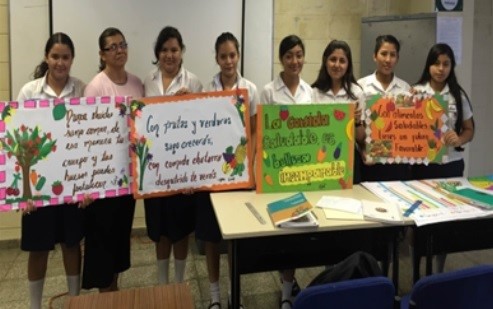Background
Food and Nutrition Education is a valuable tool to promote knowledge of Food and Nutrition Security and encourage good nutrition practices for students and their families. The experience shows that involving students and making them leaders or ambassadors of good practices in their schools is an effective methodology for promoting good habits throughout the school community. Thus, a trained group of students begins to apply and disseminate the basic concepts of food and nutrition. They become facilitators and promoters of healthy eating habits within their educational community. It is also observed in many countries that the use of the school garden as a teaching tool is very important in these activities.
Activities developed
Development of actions to train the students to become facilitators in Food and Nutrition Security. The training focused on basic concepts of food and nutrition. The work was carried out in 2017 at the Cantón San Isidro Educational Complex, in Izalco, El Salvador. As facilitators, 6 boys, 9 girls and 1 teacher were chosen, benefiting a total of 200 students and 28 teachers from the school.
Methodology
There were 4 stages – I) Coordination at the national and local levels; II) Development of training sessions; III) Promotion of team work; IV) Implementation of actions in the educational community. The coordination at the national level led by the Ministry of Education, Science and Technology of El Salvador helped in the implementation of the food and nutrition education actions with different actors of the educational community.
Then the criteria were defined, such as the age of the young leaders and the teachers who were going to accompany the experience. Later, training days were organized presenting basic concepts of food and nutrition and nutritional valu, among others. There was also practical days for food preparation, with healthy meals.
The students carried out researches in the canteen about the food preferences of the school community and developped messages promoting healthy eating habits. There was also a ‘healthy eating day’ and fairs focused on this subject
Institutions involved
Ministry of Education, Science and Technology of El Salvador, Cantón San Isidro Educational Complex, FAO El Salvador.
Qualitative and quantitative data
200 students and 28 teachers benefited
Description of the beneficiaries
200 students and 28 teachers benefited from the Cantón San Isidro Educational Complex, located in Izalco, El Salvador
Results achieved
- The school became a reference educational center at the regional level with food and nutrition education that integrates the school community;
- Participation of the students in the different activities developed: union between theory and practice;
- Recognition of students and teachers for the need to improve eating habits;
- Organization of activities in the school garden;
- Integration of the food and nutrition education with different subjects: mathematic, writing, arts, sciences, among others;
- The dissemination of actions on nutrition education in the educational community: fairs, campaigns, lectures;
- Preparation and consumption of nutritious and safe food in the school community;
- Interest of the teaching community to replicate and promote these activities within the school;
- The research carried out by the students in the school canteen were used as inputs for improving the food supply;
- The development of life skills is encouraged, such as sociability, teamwork, respect, cooperation and creativity.
Challenges and Advances
Challenges:
- To promote the integration of other students to the group of facilitators. The facilitators were from the 6th, 7th, and 8th grades. This was decided to guarantee their permanence in the school and to keep ‘spreading the word’ in the next years;
- To train new students in the coming years (sustainability of the activity);
- To have support from the school direction and training materials for future educational initiatives.
- Recognition of important dates to give young people space to integrate into scheduled activities.
Advances:
- Closer relation of the students with the school garden;
- More preparation and consumption of nutritious and safe food;
- Interest of the teaching community to replicate and promote these activities within the school;
- Recognition of students and teachers for the need to improve eating habits.
Photos of the experience







